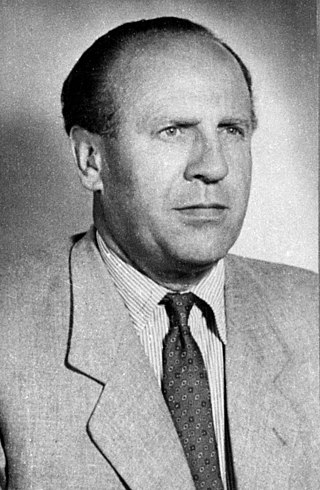
Oskar Schindler was a German industrialist, humanitarian and member of the Nazi Party who is credited with saving the lives of 1,200 Jews during the Holocaust by employing them in his enamelware and ammunitions factories in occupied Poland and the Protectorate of Bohemia and Moravia. He is the subject of the 1982 novel Schindler's Ark and its 1993 film adaptation, Schindler's List, which reflected his life as an opportunist initially motivated by profit who came to show extraordinary initiative, tenacity, courage, and dedication in saving his Jewish employees' lives.

Thomas Michael Keneally, AO is an Australian novelist, playwright, essayist, and actor. He is best known for his non-fiction novel Schindler's Ark, the story of Oskar Schindler's rescue of Jews during the Holocaust, which won the Booker Prize in 1982. The book would later be adapted into Steven Spielberg's 1993 film Schindler's List, which won seven Academy Awards, including Best Picture.
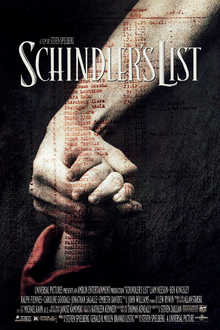
Schindler's List is a 1993 American epic historical drama film directed and produced by Steven Spielberg and written by Steven Zaillian. It is based on the 1982 novel Schindler's Ark by Australian novelist Thomas Keneally. The film follows Oskar Schindler, a German industrialist who saved more than a thousand mostly Polish–Jewish refugees from the Holocaust by employing them in his factories during World War II. It stars Liam Neeson as Schindler, Ralph Fiennes as SS officer Amon Göth, and Ben Kingsley as Schindler's Jewish accountant Itzhak Stern.
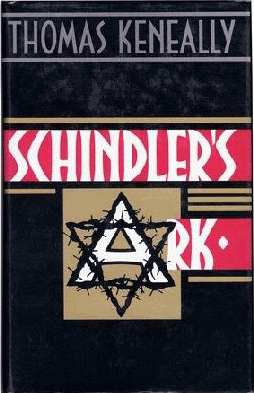
Schindler's Ark is a historical fiction published in 1982 by the Australian novelist Thomas Keneally. The United States edition of the book was titled Schindler's List; it was later reissued in Commonwealth countries under that name as well. The novel won the Booker Prize and was awarded the Los Angeles Times Book Prize for Fiction in 1983.
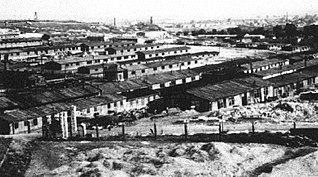
Płaszów or Kraków-Płaszów was a Nazi concentration camp operated by the SS in Płaszów, a southern suburb of Kraków, in the General Governorate of German-occupied Poland. Most of the prisoners were Polish Jews who were targeted for destruction by Nazi Germany during the Holocaust. Many prisoners died because of executions, forced labor, and the poor conditions in the camp. The camp was evacuated in January 1945, before the Red Army's liberation of the area on 20 January.

Emilie Schindler was a Sudeten German-born woman who, with her husband Oskar Schindler, helped to save the lives of 1,200 Jews during World War II by employing them in his enamelware and munitions factories, providing them immunity from the Nazis. She was recognized as Righteous Among the Nations by Israel's Yad Vashem in 1994.
Itzhak Stern was a Polish-Israeli Jewish Holocaust survivor who worked for Sudeten-German industrialist Oskar Schindler and assisted him in his rescue activities during the Holocaust.

Podgórze is a district of Kraków, Poland, situated on the right (southern) bank of the Vistula River, at the foot of Lasota Hill. The district was subdivided in 1990 into six new districts, see present-day districts of Kraków for more details. The name Podgórze roughly translates as the base of a hill. Initially a small settlement, in the years following the First Partition of Poland the town's development was promoted by the Austria-Hungary Emperor Joseph II who in 1784 granted it the city status, as the Royal Free City of Podgórze. In the following years it was a self-governing administrative unit. After the Third Partition of Poland in 1795 and the takeover of the entire city by the Empire, Podgórze lost its political role of an independent suburb across the river from the Old Town.
Leopold "Poldek" Pfefferberg, also known as Leopold Page, was a Polish-American Holocaust survivor who inspired the Australian writer Thomas Keneally to write the Booker prize-winning novel Schindler's Ark, which in turn was the basis for Steven Spielberg's critically acclaimed 1993 film Schindler's List.
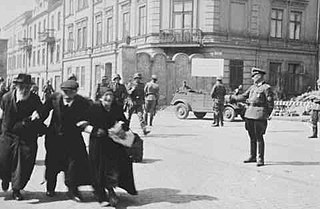
Operation Reinhard in Kraków, often referred to by its original codename in German as Aktion Krakau, was a major 1942 German Nazi operation against the Jews of Kraków, Poland. It was headed by SS and Police Leader Julian Scherner from the Waffen-SS. The roundup was part of the countrywide Aktion Reinhard, the mass murder of Polish Jews in the so-called General Government under the command of SS und Polizeiführer Odilo Globočnik.
Leopold Rosner was a Polish-born Australian musician. Rosner, who was Jewish, survived the Holocaust in Nazi concentration camps during World War II by playing his accordion for Nazi officials. This earned the attention of Oskar Schindler, who saved his life by having him placed on his famous list. His story became known after Australian author Thomas Keneally's 1982 novel, Schindler's Ark, was adapted into Steven Spielberg's Oscar-winning film, Schindler's List. He appeared in the epilogue of the film at the Schindler's grave on Mount Zion.

Oswald Bosko was an Austrian policeman from Vienna later stationed at the Jewish ghetto of Kraków from 1942 to 1944. He supported Julius Madritsch in rescuing Jews during World War II. Bosko was posthumously honored by the State of Israel as a Righteous Among the Nations, an award for a non-Jew who risked their life during the Holocaust to save Jews from extermination by the Nazis.

Julius Madritsch was a Viennese Austrian businessman who helped to save the lives of Jews during the Holocaust.

Amon Leopold Göth was an Austrian SS functionary and war criminal. He served as the commandant of the Kraków-Płaszów concentration camp in Płaszów in German-occupied Poland for most of the camp's existence during World War II.
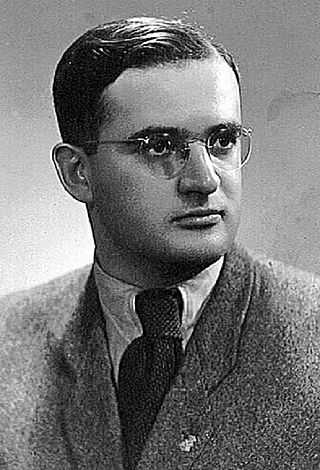
Mieczysław "Mietek" Pemper was a Polish-born German Holocaust survivor. Pemper helped compile and type Oskar Schindler's now-famous list, which saved 1,200 people from being killed in the Holocaust during World War II.
Helen Jonas-Rosenzweig was a Polish Holocaust survivor who was interned during World War II at the Płaszów concentration camp where she was forced to work as a maid for SS camp commandant Amon Göth.
Leon Leyson was a Polish-American Holocaust survivor and one of the youngest Schindlerjuden, Jews saved by Oskar Schindler. His posthumously published memoir, The Boy on the Wooden Box: How the Impossible Became Possible. .. on Schindler's List details his survival during the Holocaust.
Abraham Bankier was a Polish businessman and Holocaust survivor who assisted Oskar Schindler in his rescue activities and worked as his factory manager.

Oskar Schindler's Enamel Factory is a former metal item factory in Kraków. It now hosts two museums: the Museum of Contemporary Art in Kraków, on the former workshops, and a branch of the Historical Museum of the City of Kraków, situated at ul. Lipowa 4 in the district of Zabłocie, in the administrative building of the former enamel factory known as Oskar Schindler's Deutsche Emailwarenfabrik (DEF), as seen in the film Schindler's List. Operating here before DEF was the first Malopolska factory of enamelware and metal products limited liability company, instituted in March 1937.

The Brünnlitz labor camp was a forced labor camp of Nazi Germany which was established in 1944 just outside the town of Brněnec, Sudetengau. It operated solely as a site for an armaments factory run by the German industrialist Oskar Schindler, which was in actuality a front for a safe haven for Schindlerjuden. Administratively, it was a sub-camp of the Gross-Rosen concentration camp system.














